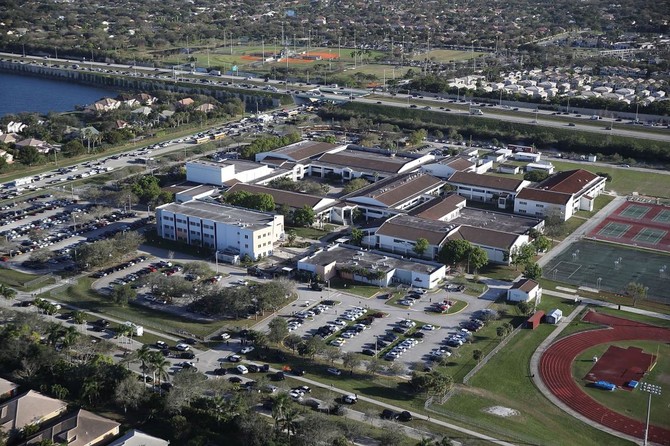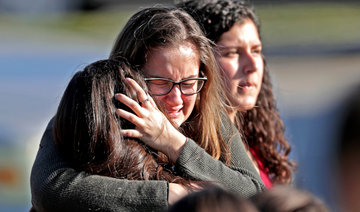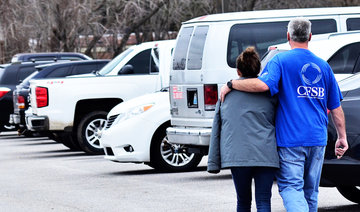PARKLAND: The suspect in a deadly rampage at a Florida high school is a troubled teenager who posted disturbing material on social media before the shooting spree that killed 17 people and wounded more than a dozen others, according to a law enforcement official and former schoolmates.
Broward County Sheriff Scott Israel said the 19-year-old suspect, Nikolas Cruz, had been expelled from Marjory Stoneman Douglas High School for “disciplinary reasons.”
“I don’t know the specifics,” the sheriff said.
However, Victoria Olvera, a 17-year-old junior, said Cruz was expelled last school year after a fight with his ex-girlfriend’s new boyfriend. She said Cruz had been abusive to his girlfriend.
School officials said Cruz was attending another school in Broward County after his expulsion.
Cruz’s mother Lynda Cruz died of pneumonia on Nov. 1 neighbors, friends and family members said, according to the Sun Sentinel. Cruz and her husband, who died of a heart attack several years ago, adopted Nikolas and his biological brother, Zachary, after the couple moved from Long Island in New York to Broward County.
The boys were left in the care of a family friend after their mother died, family member Barbara Kumbatovich, of Long Island, said.
Unhappy there, Nikolas Cruz asked to move in with a friend’s family in northwest Broward. The family agreed and Cruz moved in around Thanksgiving. According to the family’s lawyer, who did not identify them, they knew that Cruz owned the AR-15 but made him keep it locked up in a cabinet. He did have the key, however.
Jim Lewis said the family is devastated and didn’t see this coming. They are cooperating with authorities, he said.
Broward County Mayor Beam Furr said during an interview with CNN that the shooter was getting treatment at a mental health clinic for a while, but that he hadn’t been back to the clinic for more than a year.
“It wasn’t like there wasn’t concern for him,” Furr said.
“We try to keep our eyes out on those kids who aren’t connected ... Most teachers try to steer them toward some kind of connections. ... In this case, we didn’t find a way to connect with this kid,” Furr said.
Israel said investigators were dissecting the suspect’s social media posts.
“And some of the things that have come to mind are very, very disturbing,” he added without elaborating.
Daniel Huerfano, a student who fled Wednesday’s attack, said he recognized Cruz from an Instagram photo in which Cruz posed with a gun in front of his face. Huerfano recalled Cruz as a shy student and remembered seeing him walking around with his lunch bag.
“He was that weird kid that you see ... like a loner,” he added.
Dakota Mutchler, a 17-year-old junior, said he used to be close friends with Cruz but hadn’t seen him in more than a year following his expulsion from school.
“He started progressively getting a little more weird,” Mutchler said.
Mutchler recalled Cruz posting on Instagram about killing animals and said he had talked about doing target practice in his backyard with a pellet gun.
“He started going after one of my friends, threatening her, and I cut him off from there,” Mutchler said.
“I think everyone had in their minds if anybody was going to do it, it was going to be him,” Mutchler said.
Broward County School District Superintendent Robert Runcie told reporters on Wednesday afternoon that he did not know of any threats posed by Cruz to the school.
“Typically you see in these situations that there potentially could have been signs out there,” Runcie said. “I would be speculating at this point if there were, but we didn’t have any warnings. There weren’t any phone calls or threats that we know of that were made.”
However, a teacher told The Miami Herald that Cruz may have been identified as a potential threat to other students. Jim Gard, a math teacher who said Cruz had been in his class last year, said he believes the school had sent out an email warning teachers that Cruz shouldn’t be allowed on campus with a backpack.
“There were problems with him last year threatening students, and I guess he was asked to leave campus,” Gard said.
Florida school suspect’s ‘disturbing’ social media posts being dissected
Florida school suspect’s ‘disturbing’ social media posts being dissected

UK veterans are ‘ticking time bomb’ after Iraq war chemical exposure

- Fifteen former RAF personnel were deployed to the Qarmat Ali water plant in 2003, which was contaminated with sodium dichromate
- Veterans say they were not screened or protected, and are now living with serious health conditions
LONDON: Fifteen British servicemen who worked on a carcinogen-contaminated water treatment site during the Iraq war say they were not offered biological screening despite official guidance saying they should have been.
The former Royal Air Force members, who have suffered from ailments including cancer, tumors and nosebleeds, told Sky News they were offered no medical assistance or subsequent treatment after having been exposed to toxic sodium dichromate at the Qarmat Ali water treatment plant in 2003.
The channel said it had seen a letter from the RAF’s medical authority stating that senior officers knew of the dangers posed by the substance.
Peter Lewis, 53, was one of 88 personnel deployed to guard the site, which was deemed vital for getting Iraq’s oil industry up and running. He told Sky: “I’ve had eight or nine operations to remove cancer.
“I’ve had so many lumps taken out of my neck, one on my face. This is something I’m literally fighting every year now. It’s constant.”
Qarmat Ali, the former troops say, was covered in ripped bags of bright orange sodium dichromate.
“We were never warned what the bags of chemicals were,” Jon Caunt, another former serviceman, said. “We were breathing this stuff in.”
His former comrade Tony Watters added: “I never thought about what it was. We were told the site is safe.”
Several months after deployment to the site, however, the servicemen were joined by two workers wearing protective gear who placed signs around it reading: “Warning. Chemical hazard. Full protective equipment and chemical respirator required. Sodium dichromate exposure.”
Watters said: “When you left the site, your uniform was contaminated, your webbing was contaminated.
“You went in your sleeping bag, and that was contaminated. And you were contaminating other people with it back at camp.”
Andy Tosh, who has led the group of veterans as they sought answers from the Ministry of Defence, said: “Even with the warning signs going up … they kept us there. They knowingly kept us exposed.”
The RAF gave some of the men a leaflet on their return to the UK, warning of the dangers of the substance, but not all were told.
The letter seen by Sky acknowledging the dangers posed to the veterans made a “strong” link to “increased risk of lung and nose cancer” as well as numerous other issues. It suggested personnel sent to Qarmat Ali should have their medical records altered to mention their exposure to sodium dichromate.
“Offer biological screening. This cannot be detailed until the numbers exposed are confirmed,” the letter also said.
An inquiry into US personnel deployed to Qarmat Ali found that 830 people were “unintentionally exposed” to sodium dichromate, giving them access to support from the US Department of Veterans Affairs. This came after the death of Lt. Col. James Gentry from cancer in 2009, which the US Army determined came “in line of duty for exposure to sodium dichromate.”
There has been no such inquiry by UK authorities despite British personnel being deployed at the site for longer than their American counterparts.
Thirteen of them have suffered from cancer and similar symptoms, including one who developed a brain tumor.
Jim Garth told Sky: “My skin cancer will never go away … It’s treatable, but when the treatment is finished, it comes back, so I’ve got that for life really.”
Lewis added: “I’m actually getting to the point now where I don’t care anymore … sooner or later, it’s going to do me.”
Caunt described his former colleagues’ conditions as a “ticking time bomb.”
He added: “We do not know what’s going to happen in the future."
The MoD insists medical screening was offered to personnel at the time, despite the men stating that it was not. In 2024, several met with Labour MPs about the issue. One, John Healey, who is now the UK defence secretary, said at the time the veterans should have “answers to their important questions.”
In a statement, the MoD said: “We take very seriously the concerns raised by veterans who were deployed to guard the Qarmat Ali Water Treatment Plant in 2003.
“As soon as we were alerted to the possible exposure of Sodium Dichromate, an environmental survey was conducted to evaluate typical exposure at Qarmat Ali. Results showed that the levels at the time were significantly below UK government guidance levels.”
A 2004 letter seen by Sky News suggested, however, that the MoD knew the levels of sodium dichromate were higher.
“Anyone who requires medical treatment can receive it through the Defence Medical Services and other appropriate services,” the MoD said.
“Veterans who believe they have suffered ill health due to service can apply for no-fault compensation under the War Pensions Scheme.”
Watters called on the government to hold an investigation into what happened at Qarmat Ali.
“We are the working class, we are ex-soldiers who have put our lives on the line and you’re turning a blind eye to us,” he said.
Garth added: “We felt let down at Qarmat Ali all those years ago, and we still feel let down now.”













